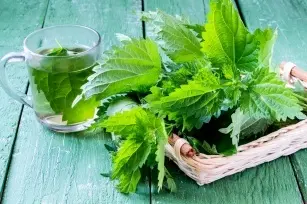
For some, nettle is just a weed, for others a plant with valuable health and healing properties. So what is the situation with this seemingly daunting plant? There is no denying that nettle is a weed that is usually associated with an unpleasant sensation when it comes into contact with it through the skin. However, one cannot forget about the properties that characterize this plant, thanks to the vitamins, microelements and mineral salts it contains. So how to use the health potential hidden in nettle?
Properties of nettle
nettle has been used in folk medicine for a long time. Nettle tea used in the case of chronic fatigue in order to eliminate it. It is also widely known to use nettle as an infusion that neutralizes tension and experienced stress. Of course, you can buy ready-made nettle juice, however, it is best to make such a juice yourself from the collected leaves, which should be blended or scalded with water and thrown into the juicer. You can also prepare one dried nettle tea, using dried leaves of the plant, pouring boiling water over them, and after a dozen or so minutes, straining. The drink prepared in this way is treated by many as a natural antibiotic. In which areas can this inconspicuous weed be used? It is characterized by diuretic properties, thanks to which nettle is used in case of diseases of the urinary system – inflammation, too little urine excretion, urolithiasis, gout. In addition, the consumption of nettle supports the removal of unnecessary metabolic products, improves the flow of fluids. It has also been proven that drinking nettle juices or adding leaves nettles for various types of dishes, it improves metabolism, cleanses the digestive system, strengthens the work of the pancreas, liver, stomach, helps to remove bile deposits. Reaches for nettle in ailments of the digestive system, gastroenteritis, diarrhea. There are also unconfirmed theories that regular consumption nettles can inhibit the growth of cancer cells. So what does this plant have in its composition, which makes it perceived as important and healing? Well, it is rich primarily in important minerals – magnesium, phosphorus, calcium, sulfur, iron, potassium, iodine, silicon, vitamins – mainly A, K, B2. In addition, it also contains tannins, organic acids, essential oils, chlorophyll, serotonin, flavonoids and others.
Drinking nettle – application and effects
nettle it is also identified as a plant with a strong hematopoietic effect, which makes it compared to iron. It improves the production of red blood cells – that’s why it is so eagerly used nettle, treating patients with anemia or chronic fatigue. The property is also proven nettles lowering blood sugar and blood pressure. nettle for skin ailments? It sounds absurd because of that nettle after all, it is perceived as an enemy for the skin, on which it leaves eruptions after contact with the leaves of this plant. However, it works well for skin ailments. It is recommended to use compresses with nettle leaves due to its antibacterial properties. Therefore, it is helpful to wash the changed places on the skin with eruptions, suppurations, boils, nodules, inflammation of the muscles. Additionally, nettle decoction can be drunk to disinfect the mouth, which also gives the effect of freshness. You can also use the slumber in nettles the power to reduce muscle tension and improve circulation by massaging the scalp nettle decoction. In addition to the aforementioned function of improving circulation, such a decoction can also help in the treatment of skin diseases – emerging dandruff, seborrhea or hair loss.









